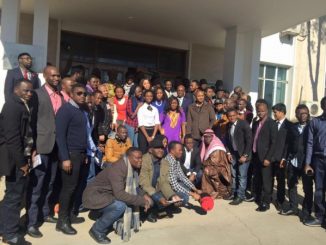Posted by Saloneman2 on September 23, 2005 at 01:01:39:
Recent analyses relative to the future governing of Sierra Leone have drawn interesting analogies between the running of a corporation and that of a state (Iscandari, 09/21/2005; Formeh Kamara, 09/22/2005). Iscandari and Formeh Kamara should be commended for attempting to apply price-taking and profit-maximizing behavior to the level of the state. However, they fail to provide a detailed insight as to how these business concepts can be successfully applied to the state in a post-war environment that is characterized by volatility. Iscandari and Formeh Kamara also leave one to wonder as to how Ernest Koroma, a chief executive of a corporation that is hardly known beyond the borders of the greater Freetown area, let alone the entire country or the West Africa sub-region can muster the skills and courage necessary to run a country of 5 million people akin to a successful business entity. I suggest that this radical approach to national reconstruction is suspect.
My approach to national reconstruction and economic development differs profoundly from those of Iscandari and Formeh Kamara in that it calls for the implementation of a delicate combination of ?wealth creation’ and ?poverty reduction’ strategies, strategies that have worked in many emerging economies. Before elucidating on these two important concepts, it is necessary to establish that Sierra Leone is poor because it has many structural impediments to economic growth. Five of these impediments can be identified as political instability, small market, macroeconomic instability, low agricultural productivity, poor infrastructure and poor governance. Poor governance can be both a cause and effect of poverty. These impediments explain why Sierra Leone finds it difficult to attract foreign investment or to even generate domestic investment. They also explain why the level of wages is low and why national savings rates continue to be low. These are not problems that can be tackled with the simple application of business concepts by a man with little experience in the political arena.
The ?wealth creation’ approach to national economic development, alluded to earlier, calls for the establishment of a close relationship between public and private sector institutions in fulfillment of the objective of government and business working together towards a common goal – creating wealth. Organizations give direct or indirect support to business while government officials articulate clear and measurable wealth creation support objectives. With ?poverty reduction’, a culture of control and monitoring is established as government focuses on securing grants for development. Limited time is allotted to income generating activities as activities having the greatest potential for reducing poverty are targeted for government spending. Although these two approaches are fundamentally different, hardly any country has used one at the expense of the other.
Sierra Leone needs an HONEST implementation of a combination of ?wealth creation’ and ?poverty reduction’ strategies to ameliorate its problems of economic growth and development. We need these strategies to solve our lack of an enabling environment for the productive use of our resources, on the one hand and our structural problems to growth, on the other. These problems have created a situation whereby we lack institutional arrangements that guarantee economic freedoms. Also, the two-tiered approach (?wealth creation’ and ?poverty reduction’) would ensure that problems that require a concerted global effort to solve are identified and closely scrutinized.




Leave a Reply